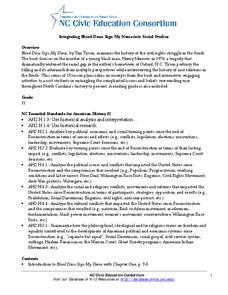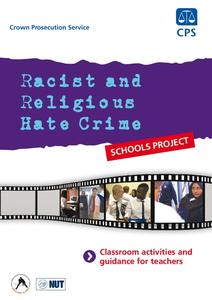University of North Carolina
Integrating Blood Done Sign My Name into Social Studies
Tim Tyson's Blood Done Sign My Name is the anchor text in a unit study of the history of race relations and the civil rights struggle in the South. The 11 lessons are richly detailed, and the unit deserves a space in your curriculum...
C3 Teachers
Murder of Emmett Till: Is It Ever Too Late for Justice?
The murder of Emmett Till is the focus of a guided inquiry that asks scholars to research the events, the trial, recent attempts to reopen the case and the effect of the murder on people today.
C3 Teachers
Uncle Tom’s Cabin: Can Words Lead to War?
"Words, words, words." Despite Hamlet's opinion, words can be significant. In this inquiry lesson, middle schoolers learn how the words in Harriet Beecher Stowe's Uncle Tom's Cabin, in the view of many, lead to the American Civil War. To...
C3 Teachers
2020 Protests: Is There Anything New about the 2020 Protests?
Are marches and protests an effective form of resistance? That is the question high schoolers seek to answer in this inquiry lesson as they compare the 2020 protests to historical ones. Researchers use Venn Diagrams to compare images...
Anti-Defamation League
The Skin I’m In: Discussion Guide for Grades 8 and Up
Words can hurt! But self-esteem can blunt the impact. That's the takeaway when discussing the themes in Sharon G. Flake's powerful novel The Skin I'm In. A discussion guide leads groups through a study of this narrative of a girl...
Penguin Books
Teacher’s Guide: The House on Mango Street by Sandra Cisneros
At first glance Sandra Cisneros' The House on Mango Street seems to be a charming collection of vignettes about a young Latina's observations about the people in her Chicago neighborhood. Developing questions that prompt readers to think...
PBS
Who, Me? Biased?: Understanding Implicit Bias
A 10-page interactive explains different facets of implicit bias, demonstrates how implicit bias works, and how people can counteract its effects. The interactive tools permit users to save their information in "My Work" folders, to take...
PBS
Character vs. Society in The Invisible Man
Ralph Ellison's Invisible Man is difficult to read and difficult to teach. The novel is so highly regarded that it is one of most often listed as an option for the AP Literature and Composition exam. The materials in this packet from PBS...
Beacon Press
A Time to Break Silence
Encourage teenagers to get involved in ending violence among young people. A Common Core-aligned resource and curriculum guide, designed to be used with a reading of A Time to Break Silence: The Essential Works...
National Humanities Center
Teaching The Great Gatsby: A Common Core Close Reading Seminar
The 41 slides in a professional development seminar model how to use close reading techniques to examine the many layers of F. Scott Fitzgerald's The Great Gatsby. In addition to passages from the novel, slides provide biographical...
Crown Prosecution Service
Racist and Religious Hate Crime
Address the current political climate with a series of thought-provoking activities. A resource packet provides pupils with strategies for challenging racist behavior and religious prejudice, and moves them from being passive bystanders...
Children's Museum of Indianapolis
Anne Frank: Facing Hatred, Daring to Dream
The stories of Anne Frank, Ruby Bridges, and Ryan White illustrate the power of children to make a difference. The three lesson in this must-have resource are designed to inspire young people to make a difference in their world....
Respect for All Project
Let's Get Real Curriculum Guide
"Let's Get Real," a documentary about cyberbullying, is the cornerstone of a curriculum guide intended to help instructors design an anti-bullying unit for middle school classes. Packet with suggestions for how plan the unit,...
New York City Department of Education
What Did I Do to Be so Black and Blue: How Did Jazz Influence Ralph Ellison's Invisible Man
How did jazz influence Ralph Ellison's Invisible Man? Class members read some of Ellison's non-fiction writings about blues and jazz, listen to records, watch videos, and engage in student-centered discussions. They then produce podcasts...
Ms. Effie's Lifesavers
Ralph Ellison’s Invisible Man in the Spotlight
Ralph Ellison's Invisible Man is the most frequently cited novel for the Advanced Placement Literature and Composition Open Response Question. Those new to using the book and and veterans as well will find the teaching strategies, the...
Facing History and Ourselves
Civil Rights Historical Investigations
The murder of Emmett Till, the Selma to Montgomery march, and the desegregation of Boston schools are the focus of three units that ask class members to investigate why these events were so key in the struggle for civil rights....
PBS
Making Change: Revolutionary Tactics of the Civil Rights Movement
The film American Revolutionary: The Evolution of Grace Lee Boggs introduces viewers to the differing philosophies of and strategies employed by 1960s civil rights leaders such as Malcolm X and Martin Luther King, Jr. and the debate over...
Facing History and Ourselves
BPS Civil Rights
Include moments of heroism in a social studies module that includes three units. Focusing on the murder of Emmett Till, the movement of nonviolent resistance, and segregating schools in Boston, the units explore key events of the...
Facing History and Ourselves
Citizen Watchdogs and the News
To conclude their case study of media coverage of the shooting of Michael Brown by a Ferguson, Missouri, police officer, class members consider the role of citizen watchdogs in a democratic society, develop strategies for combating...
Facing History and Ourselves
Hands Up, Don't Shoot!
Why is it so difficult to develop a clear understanding of the events surrounding the shooting of Michael Brown by a Ferguson, Missouri, police officer? To answer this question class members listen to a NPR discussion of the findings of...
Facing History and Ourselves
The Importance of a Free Press
"Congress shall make no law . . . abridging the freedom of speech, or of the press;. . ." Why is this guarantee of free speech and a free press the First Amendment to the US Constitution? Why are these rights so essential to a...
Facing History and Ourselves
The Power of Images
One picture but a thousand stories. As a part of a case study of how the death of Michael Brown was reported by professional news sources and on social media class members examine the reactions of various groups to a photograph taken by...
Facing History and Ourselves
Social Media and Ferguson
How can social media help or hinder civil dialogue? How can information shared on social media be verified? As the investigation of media reports of the events surrounding the shooting of Michael Brown continues, class members read...
Facing History and Ourselves
Verifying Breaking News
The attempts of journalists to verify the events surrounding the shooting of Michael Brown take center stage as individuals analyze three of the initial newspaper accounts of the story. The whole class discussion then focuses...

























